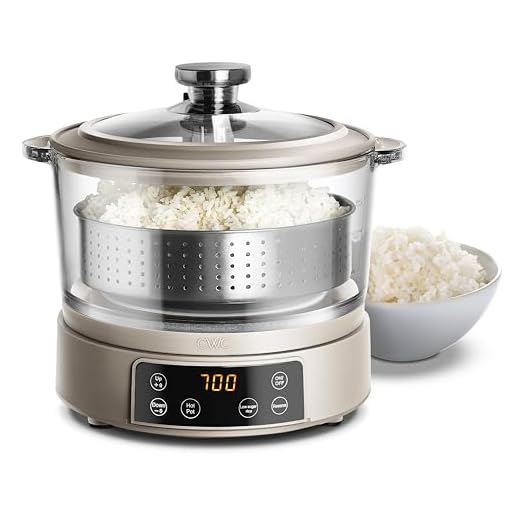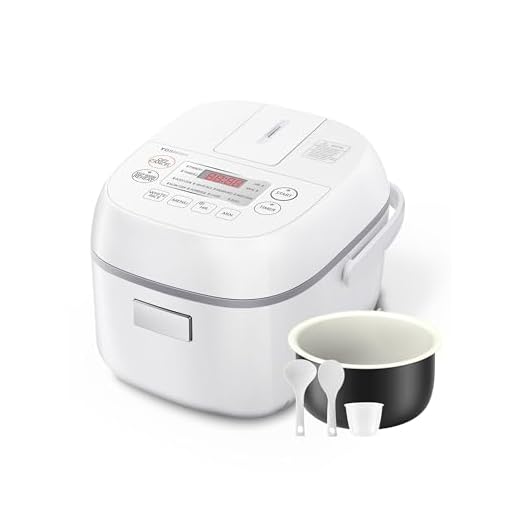



When it comes to cooking rice, many people wonder if it’s possible to put hot water in a rice cooker. After all, rice cookers are designed to cook rice with water, so does it really matter if the water is hot or cold?
The answer is yes, you can put hot water in a rice cooker. In fact, using hot water can actually help speed up the cooking process. When you add hot water to the rice cooker, it reaches boiling temperature much faster, which means the rice will be ready to eat sooner.
However, there are a few things to keep in mind when using hot water in a rice cooker. First, be sure to use the right amount of water for the type of rice you’re cooking. Different types of rice require different water ratios, so be sure to check the instructions on the rice packaging or consult a recipe.
Additionally, it’s important to remember that rice cookers are designed to cook rice at a specific temperature. Using water that is too hot or too cold can affect the cooking time and the final result. It’s best to use hot water that is around the same temperature as boiling water, which is typically around 212 degrees Fahrenheit or 100 degrees Celsius.
In conclusion, putting hot water in a rice cooker is not only possible, but it can also help speed up the cooking process. Just be sure to use the right amount of water and keep in mind the temperature recommendations for optimal results.
Understanding the rice cooker:
A rice cooker is a kitchen appliance that is specifically designed to cook rice. It consists of an inner pot, which is usually made of non-stick material, and an outer casing that houses the heating element. The rice cooker also has a lid that helps to trap the steam produced during cooking, resulting in perfectly cooked rice.
Rice cookers work by using a combination of heat and steam to cook the rice. The inner pot is filled with the desired amount of water and rice, and then placed into the outer casing. The heating element in the rice cooker heats up the water, causing it to boil and create steam. As the steam rises, it circulates around the rice, cooking it evenly and thoroughly. Once the rice is fully cooked, the rice cooker will automatically switch to a ‘keep warm’ mode to prevent the rice from drying out or burning.
The amount of water and rice needed for cooking in a rice cooker can vary depending on the type of rice and personal preference. Most rice cookers come with a measuring cup and lines on the inner pot to help guide users in determining the correct measurements. It is important to follow the instructions provided by the rice cooker manufacturer to achieve the best results.
While rice cookers are primarily designed for cooking rice, some models come with additional features that allow for the preparation of other dishes such as steamed vegetables, soups, and stews. These versatile appliances can be a convenient addition to any kitchen and can save time and effort when preparing meals.
In summary, a rice cooker is a practical and efficient tool for cooking rice. By understanding how it works and following the recommended measurements, you can achieve perfectly cooked rice every time. Whether you are a rice lover or simply looking for a convenient way to cook rice, a rice cooker can be a valuable addition to your kitchen.
Water temperature in a rice cooker:
When using a rice cooker, it is important to understand the importance of water temperature. The water temperature plays a crucial role in cooking rice to perfection. The ideal water temperature for cooking rice in a rice cooker is about 212°F or 100°C, which is the boiling point of water at sea level.
It is important to note that the water temperature will determine the cooking time and the final texture of the rice. High-quality rice cookers come with built-in sensors that can adjust the cooking time and temperature automatically for different types of rice.
When the water reaches its boiling point, it creates steam, which is trapped inside the rice cooker. The steam helps to cook the rice evenly and makes it fluffy and tender.
Adding hot water to a rice cooker is a common practice as it can help speed up the cooking process. However, it is important to be cautious when using hot water as it can cause the rice to become mushy or overcooked.
It is best to use room temperature or cold water when cooking rice in a rice cooker. This will ensure that the rice cooks evenly and retains its texture and flavor.
In conclusion, maintaining the right water temperature is crucial for cooking rice in a rice cooker. It is recommended to use room temperature or cold water to achieve the best results. Using hot water can lead to overcooked or mushy rice.
Possible consequences of using hot water:
While it is possible to use hot water in a rice cooker, there are several potential consequences that you should be aware of:
1. Uneven cooking:
Using hot water in a rice cooker can result in uneven cooking of the rice. Hot water may cause the rice to cook too quickly on the outside while remaining undercooked on the inside. This can lead to a less desirable texture and inconsistent taste.
2. Altered texture:
The use of hot water may alter the texture of the cooked rice. It can make the rice stickier or mushier, depending on the type of rice used. If you prefer fluffy and separate grains of rice, using hot water may not give you the desired result.
3. Increased cooking time:
Hot water may increase the cooking time of the rice. The rice cooker may need more time to bring the hot water to a boil, resulting in a longer cooking process. This can be an inconvenience if you are looking for a quick and easy meal.
4. Overcooked rice:
Using hot water can potentially lead to overcooked rice. The extra heat can cause the rice to become mushy or sticky, especially if left in the rice cooker for an extended period. Overcooked rice may lose its nutritional value and become less appetizing.
While some people may experiment with using hot water in a rice cooker and achieve satisfactory results, it is generally recommended to follow the manufacturer’s instructions and use the appropriate temperature water for the best outcome.
Advantages of using hot water in a rice cooker:
There are several advantages to using hot water in a rice cooker:
- Improved cooking efficiency: When hot water is used in a rice cooker, it helps to speed up the cooking process. The rice cooker can start with hot water rather than cold water, which reduces the time needed for the water to reach boiling point. This can result in faster cooking times overall.
- Better rice texture: Hot water can help to produce a softer and fluffier texture in cooked rice. The hot water helps to break down the starches in the rice, resulting in a more tender and less sticky final product.
- Enhanced flavor absorption: Using hot water in a rice cooker can help the rice to better absorb any added flavors or seasonings. The heat from the water can help to open up the rice grains, allowing them to take in the flavors more effectively.
- Energy savings: By starting with hot water, the rice cooker can use less energy to bring the water to a boil. This can lead to energy savings over time, especially if you cook rice frequently.
Overall, using hot water in a rice cooker can help to improve cooking efficiency, enhance the texture and flavor of the rice, and even save energy in the long run. It’s a simple adjustment that can make a noticeable difference in the quality of your cooked rice.
Alternatives to using hot water:
If you don’t have access to hot water or prefer not to use hot water in your rice cooker, there are a few alternative methods you can try:
Boiling water on a stovetop:
One option is to boil water in a kettle or on a stovetop and then pour the boiling water into the rice cooker. This method will still heat the rice and cook it thoroughly. However, keep in mind that the cooking time may vary compared to using hot water, so it’s essential to follow the rice cooker’s instructions and check on the rice as it cooks.
Using room temperature water:
Another alternative is to use room temperature water instead of hot water. While this method may take slightly longer for the rice to cook, it can still produce satisfactory results. Just make sure to adjust the cooking time accordingly, and check the rice for doneness before serving.
It’s important to note that using hot water in a rice cooker is generally a more efficient method, as it helps speed up the cooking process and ensures even distribution of heat. However, these alternatives can be suitable options when hot water is not available or preferred.
| Advantages | Disadvantages |
|---|---|
| Still cooks rice thoroughly | Cooking time may be longer |
| Can produce satisfactory results | May require adjustments in cooking time |
| Provides options when hot water is not available | May not result in as efficient cooking process as using hot water |
Final thoughts on hot water in a rice cooker:
In conclusion, while it is technically possible to put hot water in a rice cooker, it is not recommended. Rice cookers are designed to work with specific ratios of water to rice, and using hot water can throw off these ratios and lead to improperly cooked rice. Additionally, adding hot water to a rice cooker can increase the risk of steam burns and other accidents.
If you want to speed up the cooking time for your rice, it is better to use a pressure cooker or simply soak the rice in hot water before cooking it in a regular rice cooker.
Furthermore, using hot water in a rice cooker can also affect the longevity and performance of the appliance. The heating element in a rice cooker is designed to heat cold water to the necessary temperature for cooking rice. Pouring hot water directly into the cooker can put unnecessary strain on the heating element and potentially cause it to malfunction.
Key takeaways:
- Putting hot water in a rice cooker can lead to improperly cooked rice.
- Using hot water increases the risk of steam burns and accidents.
- It is better to use a pressure cooker or soak the rice in hot water before using a regular rice cooker.
- Using hot water can potentially affect the longevity and performance of the rice cooker.
FAQ
Can I use hot water in a rice cooker?
Yes, you can use hot water in a rice cooker. Rice cookers are designed to handle hot water and cook rice effectively. However, it is essential to maintain the appropriate water-to-rice ratio for optimal results.
Will using hot water in a rice cooker affect the cooking time?
Using hot water in a rice cooker may slightly reduce the cooking time compared to using cold water. Since the water is already hot, it will take less time for the rice cooker to reach the desired temperature. However, the difference in cooking time is usually negligible.









